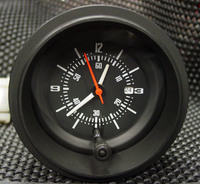
I'm fairly new to this web site and have seen several articles on clocks. This is of particular interest to me as I do have some experience with total clock reconditioning. I've been repairing, refurbishing and specializing in 70-83 Datsun /Nissan clocks for the last 8 years and thought I would pass on several bits of trivia and technical information.
I never really thought about NOT using oil on a clock as that seems to be common knowledge until a friend came to me years ago with a 240Z clock. Bill knew I worked on all sorts of electronic hardware and was soliciting my input. His problem was that his clock had stopped (like it was the only 240 clock that didn't work). I have a 75 280z and my clock has always worked. I was wondering why bills didn't? I took has clock apart and began to understand why.
Bill said he had removed the clock and flushed it out with WD-40? and then lightly oiled all the components. The clock worked for several months and then quit and this was the second time for this occurance. After I looked at the clock in detail I could see why. The automotive environment is very tough on all the components and the most critical parts are hermetically sealed. The first generation 240Z Datsun clocks were not hermetically sealed and susceptible to all the dust, dirt, chemicals, humidity and temperature.
JECO, the Datsun subcontractor, who built most of the Datsun clocks never used oiled for good reason. Oil attracts all the nasty contaminants that can wear out critical clock components and eventually grinds the clock to a halt. I know I know everyone always uses oil on their grandfathers clocks. If you think about it we change our engine oil which is filtered for the very same reason, so that the engine will last longer and not wear due to....the dirty oil.
The first generation clocks (240z) have what's called a "NO LOAD" motor which keeps the main spring of this clock contiguously wound. The rest of the clock consists of gears, paws, and bearings that rotate and work in unison to move the clock hands. The problem is that any gear or bearing that produces friction slows the entire clock and if sever enough the clock will stop. Are you beginning to see a pattern here.
Oil that is used to lubricate (all oil) coats the surface of moving parts and eventually starts to collect contaminants. Eventually this causes the viscosity (on a micro level) to thicken and produce resistance to the overall clock operation. In addition the change in temperature alone will change the oil viscosity. Believe me when I say it takes very very little resistance in any of the clock parts to stop this mechanism.
When solvent other than alcohol is used to "flush" the clock all your doing is removing the contaminants, but when you apply oil you start the process all over again. If you don't mind removing your 240z clock every year or so then I guess that's ok. After helping Bill reinstall his clock I'd opt for a clock that would work forever (we did but that's another article). The 240z guys and girls have a rough time compared to rest of us removing and installing their clock. That is unless the dash is removed.
This is what I have found works the best, denatured alcohol. You should remove each and every clock part, clean all parts with an artists brush, inspect the cleaned parts, and reassemble (NO OIL). Let me say that again...NO OIL.This can be a rather daunting task and is not for the weak of heart or those with limited patience. I know this works because I've cleaned way to many 240 clocks and I still have one of Bills 240Z clocks on my test bench. It works and it keeps pretty good time. It doesn't get much outside time, but that's why it's still working.
If I get enough interest I'll write a weekly article on "how to" for each of the four generation clocks. Like what goes wrong, how do fix it, what's interchangeable, how do I clean it, what kind of paint to use and so on.
Hope this was helpful and please give me feedback.
Thanks.........Ron





Recommended Comments
There are no comments to display.
Create an account or sign in to comment
You need to be a member in order to leave a comment
Create an account
Sign up for a new account in our community. It's easy!
Register a new accountSign in
Already have an account? Sign in here.
Sign In Now